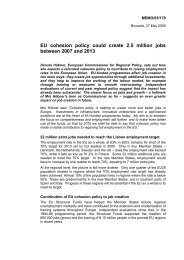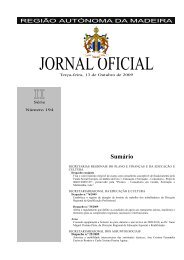Industrial Relations in Europe 2012 - European Commission - Europa
Industrial Relations in Europe 2012 - European Commission - Europa
Industrial Relations in Europe 2012 - European Commission - Europa
You also want an ePaper? Increase the reach of your titles
YUMPU automatically turns print PDFs into web optimized ePapers that Google loves.
6.6.2 Social partner <strong>in</strong>fluence on pension policy dur<strong>in</strong>g the crisis<br />
Pension reform is arguably one of the largest social policy challenges for the EU, and this has not<br />
escaped impact from the crisis. Many governments are attempt<strong>in</strong>g large-scale reforms, often <strong>in</strong> the<br />
teeth of opposition from trade unions. In many cases, reforms already <strong>in</strong> tra<strong>in</strong> have been accelerated<br />
by the crisis. In some countries, trade unions have merely registered their opposition, whereas <strong>in</strong><br />
others they have been more successful <strong>in</strong> engag<strong>in</strong>g with their government and <strong>in</strong>fluenc<strong>in</strong>g the<br />
outcome of reforms, even though they rema<strong>in</strong> <strong>in</strong> many cases unhappy with the overall outcome.<br />
In the Netherlands, for example, trade unions have succeeded <strong>in</strong> alter<strong>in</strong>g government policy to some<br />
extent: a pension reform bill was published at the end of 2011, with some concessions to trade<br />
unions and the political left. Similarly, <strong>in</strong> Italy, the government is conduct<strong>in</strong>g meet<strong>in</strong>gs with the<br />
social partners on economic reform <strong>in</strong> the context of the crisis, <strong>in</strong>clud<strong>in</strong>g pension reforms. The aim<br />
is to <strong>in</strong>crease the retirement age for men and women up to 66 for men and 62 for women by 2018.<br />
The move has been heavily criticised by all the ma<strong>in</strong> Italian trade union confederations (Planet<br />
Labor 2011b).<br />
By contrast, <strong>in</strong> the UK, trade unions have arguably had a limited impact on government pensions<br />
policy. The UK government has <strong>in</strong>troduced highly controversial reforms to public sector<br />
occupational pension schemes, aga<strong>in</strong>st fierce opposition from trade unions. In November 2011, a<br />
coord<strong>in</strong>ated 24-hour strike <strong>in</strong>volv<strong>in</strong>g members of 30 trade unions took place across the UK to<br />
protest aga<strong>in</strong>st proposed changes to public sector occupational pension schemes. Based on the<br />
recommendations of an <strong>in</strong>dependent <strong>Commission</strong>, the changes <strong>in</strong>clude replac<strong>in</strong>g exist<strong>in</strong>g f<strong>in</strong>al<br />
salary schemes with those l<strong>in</strong>k<strong>in</strong>g employees’ pension entitlements to their career average earn<strong>in</strong>gs,<br />
rais<strong>in</strong>g the age at which pensions are payable, and rais<strong>in</strong>g employee pension contributions. Trade<br />
unions had been <strong>in</strong>volved <strong>in</strong> talks on pension reform for some months for the strike action took<br />
place (Hall <strong>2012</strong>). Further, government plans to move some civil servants out of the central<br />
government pension scheme <strong>in</strong>to a privately-owned fund controlled by a profit-mak<strong>in</strong>g mutual<br />
organisation have been opposed by the Public and Commercial Services (PCS) union as<br />
“privatisation by the back door”, and the union held a strike to oppose this <strong>in</strong> July 2011 (Gall,<br />
<strong>2012</strong>).<br />
Similarly, towards the end of 2011, the Irish government published legislation aimed at reform<strong>in</strong>g<br />
pension provision for new entrants to the public service (Farrelly and Higg<strong>in</strong>s <strong>2012</strong>). The changes<br />
were announced by the government follow<strong>in</strong>g consultation with the public service unions, but no<br />
formal agreement was reached. Some changes were made to the proposals follow<strong>in</strong>g the<br />
consultation process, but teachers’ unions have strongly criticised the reforms. Table 6.3 gives an<br />
overview of trends <strong>in</strong> social partner <strong>in</strong>volvement <strong>in</strong> pension reforms dur<strong>in</strong>g the crisis.<br />
Table 6.3: Trends <strong>in</strong> the <strong>in</strong>volvement of the social partners <strong>in</strong> pension reform dur<strong>in</strong>g the crisis<br />
<strong>in</strong> selected EU Member States<br />
Country Developments <strong>in</strong> the crisis Classification<br />
Belgium<br />
Bulgaria<br />
Trade unions organised protests <strong>in</strong> 2011 aga<strong>in</strong>st the government’s lack of<br />
social partner consultation on planned pension reforms. Follow<strong>in</strong>g this,<br />
consultation took place that will <strong>in</strong>fluence the reform<br />
Trade unions staged protests aga<strong>in</strong>st government pension reform plans <strong>in</strong><br />
2011, focus<strong>in</strong>g on rais<strong>in</strong>g the retirement age. Subsequent government<br />
talks with the social partners did not, however, result <strong>in</strong> agreement<br />
Involvement (after protest)<br />
and <strong>in</strong>fluence on outcomes<br />
No embedded consultation<br />
and no <strong>in</strong>fluence on<br />
outcomes<br />
251

















